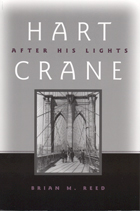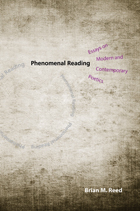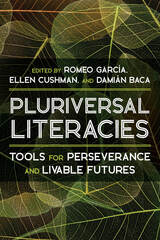2 books about Reed, Brian M.

Hart Crane
After His Lights
Brian M. Reed
University of Alabama Press, 2006
A critical reassessment of the life’s work of a major American poet.
With his suicide in 1932, Hart Crane left behind a small body of work—White Buildings (1926) and The Bridge (1930). Yet, Crane’s poetry was championed and debated publicly by many of the most eminent literary and cultural critics of his day, among them Van Wyck Brooks, Kenneth Burke, Robert Graves, Allen Tate, and Edmund Wilson. The Bridge appears in its entirety in the Norton Anthology of American Literature, and Crane himself has been the subject two recent biographies.
In Hart Crane: After His Lights, Brian Reed undertakes a study of Crane’s poetic output that takes into account, but also questions, the post-structural and theoretical developments in humanities scholarship of the last decade that have largely approached Crane in a piecemeal way, or pigeonholed him as represen-tative of his class, gender, or sexual orientation. Reed examines Crane’s career from his juvenilia to his posthumous critical reception and his impact on practicing poets following World War II. The first part of the study tests common rubrics of literary theory—nationality, sexuality, period—against Crane’s poetry, and finds that these labels, while enlightening, also obfuscate the origin and character of the poet’s work. The second part examines Crane’s poetry through the process of its composition, sources, and models, taking up questions of style, genealogy, and genre. The final section examines Crane’s influence on subsequent generations of American poets, especially by avant-garde literary circles like the New American poets, the Black Mountain School, the New York School, and the Beats.
The result is a study that complicates and enriches our understandings of Crane’s poetry and contributes to the ongoing reassessment of literary modernism’s origins, course, and legacy.
[more]

Phenomenal Reading
Essays on Modern and Contemporary Poetics
Brian M. Reed
University of Alabama Press, 2012
The essays in Phenomenal Reading entice readers to cross accepted barriers, and highlight the work of poets who challenge language-as-usual in academia and the culture at large.
Phenomenal Reading is comprised of essays that are central to how best to read poetry. This book examines individually and collectively poets widely recognized as formal and linguistic innovators. Why do their words appear in unconventional orders? What end do these arrangements serve? Why are they striking? Brian Reed focuses on poetic form as a persistent puzzle, using historical fact and the views of other key critics to clarify how particular literary works are constructed and how those constructions lead to specific effects.
Understanding that explication and contextualization do not always sufficiently harness the power of poetry, Reed pursues phenomenological methods that take into account each reader’s unique perception of the world. This collection of twelve essays values narrative as a tool for conveying the intricacy, contingency, and richness of poetic experience.
[more]
READERS
Browse our collection.
PUBLISHERS
See BiblioVault's publisher services.
STUDENT SERVICES
Files for college accessibility offices.
UChicago Accessibility Resources
home | accessibility | search | about | contact us
BiblioVault ® 2001 - 2024
The University of Chicago Press









